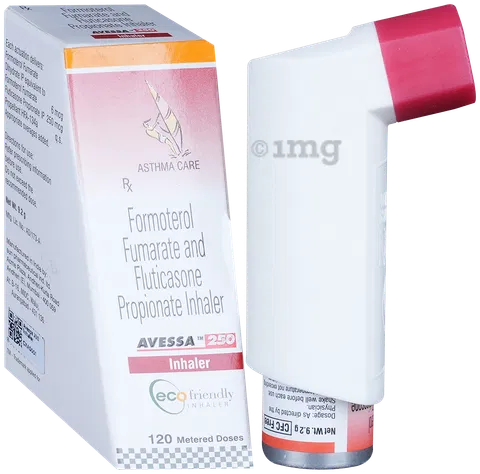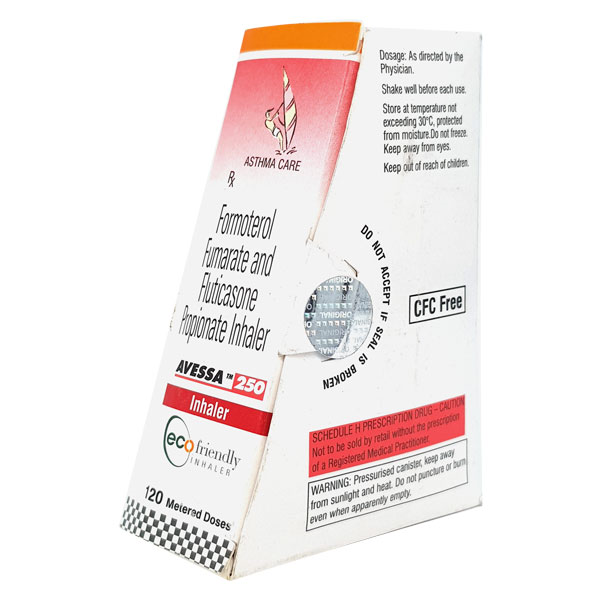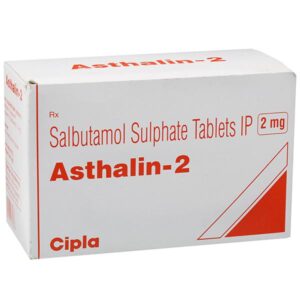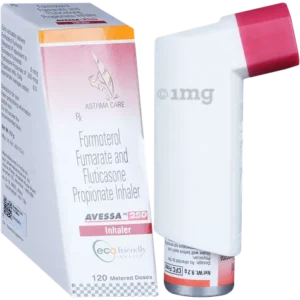Avessa 250 Inhaler 120 mdi is a combination medication primarily used to prevent and treat symptoms of asthma and chronic obstructive pulmonary diseases (COPD) such as shortness of breath or wheezing (whistling sound while breathing). Asthma is a chronic (long-term) respiratory condition in which airways narrow, swell, and produce extra mucus, leading to difficulty in breathing. COPD is a group of lung diseases with emphysema (shortness of breath) and chronic bronchitis (inflammation of the lining of bronchial tubes).
Avessa 250 Inhaler 120 mdi is a combination of two drugs, namely: Formoterol (bronchodilator) and Fluticasone propionate (corticosteroid). Formoterol belongs to the class of bronchodilators that works by relaxing muscles and widening the airways of the lungs. Thus, it makes breathing easier. Fluticasone propionate belongs to the class of corticosteroids that works by acting inside cells of the nasal lining and stops the release of certain chemicals in the body that cause inflammatory reactions. Thereby, provides relief from sneezing, runny or blocked nose, and sinus discomfort.
Avessa 250 Inhaler 120 mdi is for inhalation only. Use Avessa 250 Inhaler 120 mdi as prescribed. Your doctor will recommend how often you take Avessa 250 Inhaler 120 mdi based on your medical condition. Some people may experience headache, sore throat, sneezing, stuffy nose, hoarse voice, cough, low fever, chest tightness, a fungal infection in the mouth, sinus pain, nausea, stomach upset, dizziness, nervousness, vomiting, or irregular heartbeat. Most of these side effects of Avessa 250 Inhaler 120 mdi do not require medical attention and gradually resolve over time. However, if the side effects persist or worsen, please consult your doctor.
If you are allergic to Avessa 250 Inhaler 120 mdi or any other ingredients, please tell your doctor. If you are pregnant or breastfeeding, please inform your doctor before using Avessa 250 Inhaler 120 mdi. Avessa 250 Inhaler 120 mdi is not recommended for children below 12 years of age. Use of Avessa 250 Inhaler 120 mdi may worsen asthma symptoms in some patients. If you experience severe difficulty in breathing, please consult a doctor immediately so that alternative medicine may be prescribed. Regular monitoring of potassium levels is recommended while taking Avessa 250 Inhaler 120 mdi as it may cause low potassium levels in the blood. If you have high blood pressure, diabetes, chest or lungs infection, hyperthyroidism (overactive thyroid), hypokalaemia (low potassium levels in the blood), glaucoma, cataracts, osteoporosis (weak bones), tuberculosis, heart, liver, or adrenal gland problems, inform your doctor before taking Avessa 250 Inhaler 120 mdi.
Uses of Avessa 250 Inhaler 120 mdi
Treatment of Asthma, Chronic obstructive pulmonary disease (COPD)
Medicinal Benefits
Avessa 250 Inhaler 120 mdi is a combination of two drugs, namely: Formoterol and Fluticasone propionate that is used to treat symptoms of asthma and chronic obstructive pulmonary diseases (COPD). Formoterol belongs to the class of bronchodilators that works by relaxing muscles and widening the airways of the lungs. Thus, it makes breathing easier. Fluticasone propionate belongs to the class of corticosteroids that works by acting inside cells of the nasal lining and stops the release of certain chemicals in the body that cause inflammatory reactions. Thereby, provides relief from sneezing, runny or blocked nose, and sinus discomfort.
Directions for Use
Shake the inhaler well and check the label for directions before using Avessa 250 Inhaler 120 mdi. Avessa 250 Inhaler 120 mdi is for inhalation only. Take Avessa 250 Inhaler 120 mdi daily at the same time to maintain a consistent level of Avessa 250 Inhaler 120 mdi in the body. While you are breathing Avessa 250 Inhaler 120 mdi from the mouth, press down inhaler once to release the medicine and hold your breath for 10 seconds. Repeat until you have inhaled the number of puffs as advised by your doctor. Rinse your mouth with water and spit it out after using Avessa 250 Inhaler 120 mdi to avoid fungal infections in mouth and throat.
Storage
Store in a cool and dry place away from sunlight
Side Effects of Avessa 250 Inhaler 120 mdi
- Headache
- cold symptoms such as sore throat, sneezing, stuffy nose, sinus pain
- Hoarse voice
- Cough
- Low fever
- Chest tightness
- Nausea
- Stomach upset
- Dizziness
- Nervousness
- Vomiting
In-depth Information
Drug Warnings
If you are allergic to Avessa 250 Inhaler 120 mdi or any other ingredients, please tell your doctor. If you are pregnant or breastfeeding, please inform your doctor before using Avessa 250 Inhaler 120 mdi. Avessa 250 Inhaler 120 mdi is not recommended for children below 12 years of age. Use of Avessa 250 Inhaler 120 mdi may worsen asthma symptoms in some patients. If you experience severe difficulty in breathing, please consult a doctor immediately so that alternative medicine may be prescribed. Contact your doctor if you have blurred vision or any other vision disturbances while taking Avessa 250 Inhaler 120 mdi. Regular monitoring of potassium levels is recommended while taking Avessa 250 Inhaler 120 mdi as it may cause low potassium levels in the blood. If you have high blood pressure, diabetes, chest or lungs infection, hyperthyroidism (overactive thyroid), hypokalaemia (low potassium levels in the blood), glaucoma, cataracts, osteoporosis (weak bones), tuberculosis, heart, liver or adrenal gland problems, inform your doctor before taking Avessa 250 Inhaler 120 mdi.
Drug Interactions
Drug-Drug Interaction: Avessa 250 Inhaler 120 mdi may interact with bronchodilators (salbutamol, aminophylline, theophylline), steroids (budesonide, prednisone, mometasone, beclomethasone), heart-related medicines (sotalol, digoxin, disopyramide, procainamide, quinidine), drugs used to treat Hodgkin’s disease (procarbazine), water pills (furosemide), antibiotics (telithromycin, furazolidone, clarithromycin), drugs used to lower high blood pressure (atenolol, metoprolol, propranolol), medicines to induce labour (oxytocin), antithyroid agent (levothyroxine), antidepressants (imipramine, amitriptyline, isocarboxazid, phenelzine), antifungals (itraconazole, ketoconazole), HIV medicines (atazanavir, ritonavir, nelfinavir, indinavir, cobicistat, saquinavir) and antiparkinson drug (levodopa).
Drug-Food Interaction: Avessa 250 Inhaler 120 mdi may interact with grapefruit and grapefruit juice. Therefore, avoid intake of grapefruit or its juice with Avessa 250 Inhaler 120 mdi as it may lead to severe adverse effects.
Drug-Disease Interaction: If you have high blood pressure, diabetes, chest or lungs infection, hyperthyroidism (overactive thyroid), hypokalaemia (low potassium levels in the blood), glaucoma, cataracts, osteoporosis (weak bones), tuberculosis, heart, liver or adrenal gland problems, inform your doctor before taking Avessa 250 Inhaler 120 mdi.
Drug-Drug Interactions Checker List
- SALBUTAMOL
- AMINOPHYLLINE
- THEOPHYLLINE
- BUDESONIDE
- PREDNISONE
- MOMETASONE
- BECLOMETASONE
- SOTALOL
- DIGOXIN
- DISOPYRAMIDE
- PROCAINAMIDE
- QUINIDINE
- FUROSEMIDE
- TELITHROMYCIN
- CLARITHROMYCIN
- ATENOLOL
- METOPROLOL
- PROPRANOLOL
- OXYTOCIN
- LEVOTHYROXINE SODIUM
- IMIPRAMINE
- AMITRIPTYLINE
- ISOCARBOXAZID
- PHENELZINE
- ITRACONAZOLE
- KETOCONAZOLE
- ATAZANAVIR
- RITONAVIR
- NELFINAVIR
- INDINAVIR
- COBICISTAT
- SAQUINAVIR
- LEVODOPA
- PROCARBAZINE
- FURAZOLIDONE
Habit Forming
No
Diet & Lifestyle Advise
- Eat a healthy diet and exercise regularly to strengthen your breathing muscles and boost your immune system.
- Avoid foods such as cabbage, beans, garlic, onions, shrimp, pickled food, dried fruits, fried foods, carbonated drinks, wine, bottled lemon, and lime juice as it may worsen asthma symptoms.
- Do meditation, deep breathing, regular exercise, and try progressive muscle relaxation techniques to get relief from stress and reduce the risk of an asthma attack.
- Quit smoking as it may reduce the effectiveness of the Avessa 250 Inhaler 120 mdi and irritate the lungs worsening breathing problems.
- Learning breathing exercises will help you move more air in and out of your lungs.
Special Advise
Regular monitoring of blood sugar levels is recommended while taking Avessa 250 Inhaler 120 mdi especially if you have diabetes as it may increase blood sugar levels.
Patients Concern
Disease/Condition Glossary
Asthma: It is a chronic (long-term) respiratory condition in which airways narrow, swell, and produce extra mucus, leading to difficulty in breathing. The symptoms of asthma include wheezing (whistling sound while breathing), shortness of breath, chest tightness, and cough, especially at night. The symptoms of mild persistent asthma may occur more than 2 times in a week and up to 4 nights in a month whereas, in the case of severe persistent asthma, the symptoms occur several times every day and most nights. The treatment for asthma includes medication, breathing exercises, and self-care.
Chronic obstructive pulmonary disease (COPD): It is a group of lung diseases with emphysema (shortness of breath) and chronic bronchitis (inflammation of the lining of bronchial tubes). The major cause of COPD is smoking tobacco. Also, long-term exposure to fumes and chemicals may lead to COPD. The symptoms include chronic cough, shortness of breath, or wheezing (whistle sound while breathing).







Reviews
There are no reviews yet.